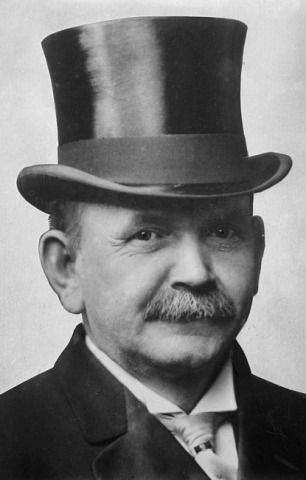
The Underground Thomist
Blog
The Not So Neo PagansSunday, 11-01-2015
One might have thought ancient pagan religion was over and done with, and I’ve written about the profound ways in which the new paganism differs from the old. Yet one cannot help but be struck by the fact that despite these great differences, the ancient pagan motifs keep coming back in new guises. In a previous post I called attention to the resurfacing of the old demigod motif – for the lowbrow, in superhero fiction, for the highbrow, in the transhumanist movement. Here’s another re-emergent motif: Gnosticism. The ancient Gnostic heresy conceived the world we know not as the wise creation of a God who knows His creation intimately, but as the ignorant creation of a demiurge, who was itself an emanation of a deity who has no knowledge of us at all. The material realm in which we dwell is not what it appears to be, but an illusion, a reflection of a reflection of a reflection, shot through with error. Only a few know the Secret. That was long ago. But in one form or another, the mystique of the Secret has overshadowed many eras, and its finds favor again in our own. Take political philosophy. According to the Straussian movement, all the great thinkers are supposed to have veiled their true meaning in deceptive words, lest the vulgar be disturbed. This movement splits into several wings, one of which, influenced by Nietzsche, has it that the deepest truth is that we are cut off from deepest truth. It would seem to follow that the philosophical life is not the life of seeking truth, but the life of going through the motions thereof. Or take biology. According to a view popularized by zoologist Richard Dawkins, “We are survival machines, robot vehicles blindly programmed to preserve the selfish molecules known as genes.” Philosopher Michael Ruse and entomologist E.O. Wilson argue that for this reason, much of what we think about reality, especially ethics and the belief in God, is “an illusion fobbed off on us by our genes to get us to co-operate.” They do not seem to notice that if their view of how our minds work is true, then it is hard to see why it shouldn’t also apply to belief in logic, causality, and genetic determinism. At the other end of the cultural ladder, the mystique of the Secret is one of the most pervasive tropes in speculative fiction. It comes in many flavors, but they all have that Orphic tang. One of them has it that the whole universe is a simulation running on a big computer. But the universe in which the computer exists is itself a simulation, running on yet another computer. And so on through universe after universe, simulation after simulation, virtual machine after virtual machine, and the original machine doesn’t even know about us. So the great question for the characters who find out the Secret is whether to go on living in a flawed virtuality, or try to hack into the source code. Which is a little like supposing that the notes in a musical composition could rewrite the score. Some read this sort of thing with all of the seriousness of religion. Others read it for amusement -- but we should not underestimate the power of our amusements to shape how we view the world.
|
Two Ways to Think About BabelFriday, 10-30-2015
A colleague of mine worries about the cacophony of voices in the modern world. Instead of complaining that we have no answers, he complains that we have too many – there are too many religions, too many philosophies, too many sacred texts. We are in a new and unprecedented intellectual condition, he tells me -- a Pluralism. Understand that he is not a relativist; it would be impossible to rate too highly the persistence with which my friend seeks absolute values in this Babel. My disagreement begins with his description of the Babel as new. After all, the Tower of Babel is a very ancient tale, and just as many voices, sects, and doctrines quarreled in premodern times as today. Nor were the thinkers of those times deaf to all the racket. Augustine contended with Gnostics, Platonists, Jews, Stoics, and Epicureans, among others. Maimonides wrote a Guide for the Perplexed. Thomas Aquinas cast his Summa Theologiae in the form of disputed questions. What I am suggesting is that Babel is not a modern revolution, but the enduring condition of the fallen human race. Even so there is something new in the manner in which my friend and other moderns respond to Babel. It is not surprising that some thinkers deny absolute values; in one form or another, relativists, sophists, and skeptics have been with us from the beginning. Nor is it strange that others affirm them; in most eras the relativists, sophists, and skeptics have been in the minority. The novelty lies the way in which moderns affirm absolutes, when they do affirm absolutes. Let me contrast their way, which my friend and many scholars call Pluralist, with the older way, which I will call Classical.All those who practice the Classical way of affirming absolute values have two things in common. If you will pardon the coinages, they are all apologetical, and they are all noetic. By calling them apologetical, after the Greek word for a speech in defense, I mean that each stakes a claim and defends it. Each makes some one voice in the Babel his own, then takes on his competitors by arguing the issues on their merits. The Epicurean tells you why he thinks pleasure the sovereign good; the Christian tells you why he thinks Jesus the risen son of God; the Gnostic tells you why he thinks evil coeval with good. And by calling them noetic, after the Greek word for knowledge or understanding, I mean that their arguments appeal to shared knowledge rather than shared ignorance. Aristotle begins every ethical discussion with what almost all men in almost all times and places have believed. St. Paul, who quotes poets to pagans, says that God has not left Himself without a witness even among the nations; He has written His law on the heart. Thomas Aquinas holds that there are certain moral principles we can't not know -- principles that do not have to be proven because they are what everything is proven from. C.S. Lewis dares his readers to "Think of a country where people were admired for running away in battle, or where a man felt proud for double-crossing all the people who had been kindest to him. You might just as well try to imagine a country where two and two made five." Even Wittgenstein nods in the noetic direction when he calls philosophy an "assembling of reminders" rather than a discovering of things that have never been noticed before. Notice that because a Classical affirmer is noetic, he does not take the Babel around him quite at face value. He will say that if I seem completely ignorant of a basic moral precept, the reason is less likely to be that I really don’t know it, than that I don’t want to know it and am holding my guilty knowledge down. Moreover, the Classical affirmer will regard an age like our own, in which even the most basic moral precepts are widely and increasingly denied, as exceptional even for this broken world. Before too long, any culture in deep moral denial must either come to its senses or collapse, for the consequences of denying first principles are cumulative and inescapable. By contrast with the Classical way of affirming absolute values, the Pluralist way is anoetic and anapologetical. Pluralists are anoetic because they do take the Babel around them at face value. Their arguments appeal to shared ignorance rather than shared knowledge. So far as we know, they say, every religion and every philosophy is equally in the dark and equally in the light. Although Pluralists may well agree that our age is exceptional rather than typical, they see this not as an omen of corruption but as a portent of an impending forward leap -- a sign that our old philosophies have exhausted themselves and we need to try something new. As to this something new – that is where being anapologetical comes in. The Pluralist denies the need to make one voice in the Babel his own; he refuses to stake out a position, then argue its claims on their merits. By adopting a posture of neutrality among competing goals and aspirations, of equal concern and respect for them all (that becomes one of his absolutes), he tries to escape the futility of interminable apologetics and carve out a new moral sphere in which people of every point of view can get along: Sodomists with Socialists, pickpockets with Platonists, hedonists with Hasidim. Notice how this works.The Pluralist does not object to Christianity, say, as a mistaken point of view; disputing its claims would be too crude. Rather he objects to it as a point of view -- just one more of the pullulating things, down there among the Platonists and pickpockets. Pluralism floats chastely above them, out-topping knowledge by the sheer force of nescience. "Others abide thy question; I am free." But in fact Pluralism does not float above them. It only seems to. Is there a way to have equal concern and respect for the views of both the rapist and the woman he wants to rape? Of course not. Either he gets his way, or she gets hers. Admitting this, my friend tries to defend the ideal of equal respect as merely a starting rather than an ending point. For example he says that the rapist may be thwarted because he has already broken the symmetry: She respects his plans, but he does not respect hers. But this isn’t true. It is a part of her plan that men in the neighborhood comply with her ideas of proper male behavior no less than it is a part of his plan that women in it comply with his ideas of proper female behavior. The true reason we call his plan wicked and not hers is that we already know that rape is wrong; in other words we know that her aspiration for men and women to act like gentlefolk is good, whereas his aspiration for them to act like animals is bad. Neutrality is not our starting any more than our ending-point. The Pluralist only lets in by the back door what he has thrown out the front. Fooling ourselves about our starting points might not be so bad if we always wound up where we ought to be, but that is not what happens in Pluralism either. My colleague thinks reasonable people of all persuasions will agree that since we do not know whether the fetus is a human being, we should let each woman decide for herself whether to have an abortion or not. There is the argument from ignorance again. But even if it were true that we do not know what babies are -- a point I do not concede -- why should we say that because the baby might not be human we may kill him? Why not say that because he might be, we should protect him? We do not say that because I might not hit anyone, I may swing my hatchet blindly in a crowded room; we say that because I might hit someone, I shouldn't. Besides, it is a little thin to claim certainty that humans have surpassing value, yet ignorance about whether our own young are human -- to flaunt our wisdom about thewhat of being human, yet deny having any about the who. What we see then is that decision is never neutral, and Pluralism functions merely as a license to be arbitrary. While claiming to reconcile competing views without deciding which is true, it covertly supposes the truth of one of them but spares itself the trouble of demonstration. If I may be allowed to conclude with an understatement, the Classical way of affirming absolute values has more going for it than the Pluralists concede. Certainly it has more integrity. Maybe we should not take the surrounding Babel at face value; maybe we should go back to apologetics. If we are serious, we might even consider believing something.
|
The New Marriage and its ConsequencesWednesday, 10-28-2015
Speaking in Florida, October 29: “Marriage in Crisis” Something I have said before: Natural marriage is the sole institution that can give children a fighting chance of being raised by their natural parents. Viewed from this perspective, the most fundamental lesson of Obergefell v. Hodges, the “gay marriage” decision, isn’t about homosexuality per se. Rather it is that the fundamental premise of family law has changed. Henceforth its chief concern is no longer to be the well-being of children, but the accommodation of the sexual desires of adults. Ever since I began making this argument, I have been told that all sorts of sexual arrangements are okay for bringing up children. I am bigoted to suggest that a child needs a mom and a dad. Moms and dads, men and women, are interchangeable. Very well. Why not three adults of assorted sexes? Why not five? Why not twenty – after all, hasn’t it been said that it takes a village to raise a child? Try to imagine what child visitation rights will look like after the dissolution of an N-tuple. Libertarians like Rand Paul say that the problems will all be solved by taking the law out of marriage and leaving everything up to private contracts. This will not solve any problems; it will only ratify them. For if the law backs out of marriage, what is there to guarantee that these supposed contracts will protect children?
|
Can God Not Be Enough?Monday, 10-26-2015
Speaking in Florida, October 29: “Marriage in Crisis” Question:For as long as I can remember, I've had an unsatisfactory relationship with God. I've never really had a sense of true communion with God; all of my prayers and devotional readings have been driven by an undercurrent of guilt and fear that I've committed some grave wrong doing for which God will eternally hate me. I am under the firm belief that everything about me is completely unacceptable to God. I am also plagued by an incurable loneliness. Fellowship with others often leaves me unsatisfied; I try to forge a deeper connection and often fail. At the same time, I'm afraid that when others get close enough to me, they'll find some Dark and Terrible Flaw that renders me unlovable. For my whole life, I've tried to be a dedicated Christian. I've always attended church; I've been on countless youth retreats and mission trips; I have strong Christian friends whom I admire and from whom I seek counsel; I used to have a strong prayer and devotional life, but it never felt like enough. The Bible has been empty for me more often than not, and my prayer life has offered little comfort or insight. My prayers are often tortured pleas of not understanding why I am so far away from God. I've often found myself wondering if I was ever really a Christian at all, because of my constant emptiness. I've always wanted to be satisfied by God, but that satisfaction has never come; that resting in the assurance of His goodness and mercy and righteousness has always eluded me. I feel like I've done all the motions correctly, but have reaped none of the rewards. If I've had the heart to seek Him, why have I not been able to find Him? What more do I have to do, how much harder do I have to pray, how much more desire do I have to have? God has moved in my life in many ways, and I don't discount any of His blessings. I would just like to know why I feel so unfulfilled and what I can do to change. I've come to the realization that God Himself is not enough to satisfy me, and I don't understand why. Reply:My dear, you are not longing for something more than God; as you have always known, as you know now, and as you knew even when you wrote, God is precisely what you are longing for. He is the perfect and all-complete Good; He is fulfillment Himself, in person. For something to be better than God would be like something being warmer than heat, brighter than light, or more audible than sound. Every partial and inadequate good that we experience is a foretaste of Him; He is the Good in its Fullness. Your unfulfilled desire for Him is so painful that you wonder whether some Dark and Terrible Flaw has made you unlovable to Him. Nothing could be more contrary to the truth. In His eyes, that longing for Him, that aching hunger so relentless that it can be satisfied by nothing short of Himself, is one of the most loveable things about you. He loves each of us, but I am speaking of the way He loves you personally. He has a special love for all those who experience that particular sort of suffering. Why else would He have said such things as "Blessed are the poor in spirit, for theirs is the kingdom of heaven," "Blessed are those who mourn, for they shall be comforted," "Blessed are those who hunger and thirst for righteousness, for they shall be satisfied"? If your longing for Him is so great, then why is it so unfulfilled? For several reasons, two lesser and one greater. You have a good deal of insight into the first of the lesser reasons already, and I've pared your letter down to the bare bone for posting on the web. As you explain in the original, longer version, your relationship with your Dad, good man that he is, leaves something to be desired. While you were growing up, his emotional disorder made his behavior, moods, and methods of discipline so unpredictable that, as you write, "I had no frame of reference for what he considered to be right or wrong, therefore I believed that I must always be wrong." The only thing missing from these premises is the conclusion. You were not always wrong. Your persistent fear that you cannot please your Heavenly Father is an irrational residue of your lifelong inability to know what would please your earthly father. That feeling of fear is lying to you. Therefore place your confidence in God, not in your feelings about Him. St. Paul says that in everything God works for good with those who love him, and He does not leave His good work unfinished. The second of the two lesser reasons for your unfulfillment is that you are relying too much on yourself. For two long you have tried to pile up good deeds to please God -- your "countless" mission trips and all the rest. Don't misunderstand me; they were very good things, and He does care how we live. As John explains, "this is love, that we follow His commandments; this is the commandment, as you have heard from the beginning, that you follow love." But remember that what makes our offerings of love acceptable to Him, imperfect as they are, is His grace acting in and through us. As the ancient sacrifices at the altar were sprinkled with the blood of animals, so our self-sacrifices are sprinkled with the blood of Christ. This fact too should reassure you. I called these the lesser reasons for your unfulfillment. The greater reason, I think, is this: You are expecting the perfect rest and satisfaction of God in this life. A few paragraphs ago I wrote that every partial and inadequate good that we experience is a foretaste of Him. Let me expand that remark. Certain false teachers say that if only we follow Christ, we will see Him with perfect clarity right now and be perfectly happy. I hope they are merely foolish, rather than liars. They are certainly mistaken. Why else would Paul have written, "For now we see in a mirror dimly, but then face to face"? He goes on to explain, "Now I know in part; then I shall understand fully, even as I have been fully understood." The Father of Lights is preparing us for fulfillment in Him. That is the meaning of the virtue of Christian hope: It means the hope of seeing Him – which is the hope of heaven. Do we yearn and cry out in the ache of that hope? Of course we do. Why should we be surprised? Let me quote St. Paul again: "We know that the whole creation has been groaning in travail together until now; and not only the creation, but we ourselves, who have the first fruits of the Spirit, groan inwardly as we wait for adoption as sons, the redemption of our bodies. For in this hope we were saved. Now hope that is seen is not hope. For who hopes for what he sees? But if we hope for what we do not see, we wait for it with patience." So go on aching for God, child. Go on yearning for Him. It is His Spirit that moves you to yearn and to ache, drawing you on to Himself. I advise only one change in what you are doing. But it is a big one. Here it is. You write, "I used to have a strong prayer and devotional life, but it never felt like enough." Who told you that prayer had to feel a certain way to please God? God didn't tell you that. Or did you think that God Himself is a feeling? He didn't tell you that either; if He were a feeling, that would make Him just a part of you. At best, our feelings are responses to God. All too often they are responses to something else. He is That to Whom we hope to respond in feelings, thoughts, and faith acting in love: Reality, the Holy One, the Awesome Truth. But One day our feelings and all the rest of us will all come into order, when at last He is all in all. We breathe because we need to breathe, eat because we need to eat, drink because we need to drink -- not, if we are wise, because these things give us feelings. Why should prayer be any different? But "Be constant in prayer," Paul tells the Romans; "Pray at all times," he tells the Ephesians, "constantly," he tells the Thessalonians. "Have no anxiety about anything," he says to the Philippians. James writes, "Is any one among you suffering? Let him pray. Is any cheerful? Let him sing praise." Jude writes, “wait for the mercy of our Lord Jesus Christ unto eternal life." That's the ticket: Wait for His mercy. The virtue of hope is particularly difficult for many people today, and you are not alone. Hope has become a heroic virtue. Really it was always beyond our unaided capacity; in this age of doubt it is even more so. But that is the point. We rejoice even in exile, because are not without aid. It wasn’t for nothing that St. Paul said God’s power is made perfect in our weakness. And He makes you a promise: If you yield even the suffering of unfulfilled longing to God, He will use that suffering to hasten His work in you. "Blessed is the man who endures trial, for when he has stood the test he will receive the crown of life which God has promised to those who love Him." Thank you for writing. In recent years I have found it necessary to write much more than I used to, and much more than I had expected to, about the pain of the longing for God. Your letter voices the longings of many more than you think.
|
Scholarship as a CallingSunday, 10-25-2015
Speaking in Florida, October 29: “Marriage in Crisis” I think of scholarship as a calling. No, I’m not putting on airs. A great many things are callings. For example, even if you are not called to a particular profession over others, you may be called to be a husband and father. If you care lovingly for your children and your wife, and you work hard at the work you can get, you are doing well. Perhaps I am mistaken that scholarship is a calling. But if it is, then several things follow. One is positive: If you are called to scholarship and you aren’t doing it, you ought to be. I am not speaking of how you draw your salary; fortunate is the scholar who can make a living at his craft. But you can practice studium even if you lay bricks for a living. Another is negative: If you aren't called to scholarship, you should probably get out of it. Find out what you should really be doing. Many of my students enter scholarship merely because they the life of an academic seems pleasant to them, or some teacher told them they had promise. Things like that are well and good, and for another line of work – say, accountancy -- they may be enough. But they do not add up to a calling. The call is not just to be a scholar, but to be a particular scholar. Put another way, the call has four notes, and one must listen for each one of them. There is a callnote to scholarship as such; there is a callnote to a particular discipline; there is a callnote toward a particular task in that discipline; and there is even a callnote toward certain insights concerning that task. The reason is that although there is only one truth, each of us is better at seeing certain fragments of it than others are. The Maker may give you many insights. He may give you several. He may give you only one. Never mind if that one insight is all you have. For you -- just because it is His gift -- it is a facet of that gem of great price you should never let go.
|
The Anti-Capitalist ClassFriday, 10-23-2015
Speaking in Florida, October 29: “Marriage in Crisis” Capitalists no longer believe in capitalism. One might argue that they never did, for the anti-capitalist motives of capitalists have been recognized since Adam Smith. That's why he railed against government-protected privileges and monopolies, which in our day are called crony capitalism. The free market revolution, then, was not so much the rise of a capitalist class as the rise of a certain economic belief among this rising class: The belief that competition, rather than governmental favoritism and restraint of trade, is the best way to get ahead. That belief is dying. Why? Probably because the dominant psychological and organizational type of capitalist is no longer the entrepreneur, bless him, but the bureaucrat. That part isn’t surprising; the economies and technologies of scale require large organizations, and the managers in the second generation after the founding of a firm don’t burn with the founder’s fire. What is surprising is that nowadays even those who do have entrepreneurial ability try to convert themselves into government dependents as quickly as they can. Case in point: Elon Musk. Tesla Motors and Space X would be nothing without state patronage. This is not free enterprise; it is merely socialism with outsourcing.
|
Letting the Other Guy Make the RulesWednesday, 10-21-2015
A good many years ago, I was contacted by a couple of speechwriters and policy folk for one of the presidential candidates to ask me for help with “the vision thing.” I gathered that they were talking to a lot of people. Since the specific issue they were asking about was one I know something about, we had a conference call. You must not imagine that this happens to me often; in fact it was the only time. That may give you a clue as to how the talk went. I told them that I thought P about the issue. That didn’t satisfy them, because they wanted to know what their candidate should say about it. Naturally, believing P, I said I thought he candidate should say P. Then they told me he couldn’t say P. I asked why he couldn’t say P. Did he find P difficult to explain? Perhaps I could help with that. No, that wasn’t it. The reason he couldn’t say P was that the media always framed the issue in terms of Q. I told them I understood that, but Q was a misleading way to frame it. So, I said, their candidate needed to reframe the issue for the public in terms of P, and explain why Q was misleading. And I suggested some of the ways he might do this. They began to get irritated. As they explained, they weren’t interested in reframing the issue in terms of P. All they wanted was for me to tell them how the candidate could justify his position in terms of Q. Why? Because – as they said again -- that’s how the media framed it. So I put my point just a little more strongly. If their candidate allowed his opponents to get away with framing the issue in a misleading way, he would lose the argument. If he wanted to win the argument, he would reframe it. As though they were talking to a dimwitted child, they repeated that reframing the issue was impossible. I answered that it is never impossible to reframe an issue: That’s what you do in a republic. You have to frame it so tersely and memorably that even a hostile media can’t resist quoting you, and the quote can’t be taken out of context. I said the other side understood this very well. That was why it was winning the argument. That’s when the gentlemen lost patience with me. Don’t you understand? The media are all-powerful! It doesn’t matter how they frame an issue, because once they do, it’s set in stone! Nobody can challenge it! It has to be accepted! NOW will you tell us how our candidate can make his argument? I said you would be able to guess how it went.
|






